Investing.com’s stocks of the week
By Pinchas Cohen
Market Recap
Democrats' chances of winning next year's mid-term Congressional elections rose Wednesday on key victories in governor races and state legislatures. This puts Republicans at a bargaining disadvantage, requiring them to further compromise to do whatever it takes to put a single check-mark in what has become a very blank legislative box.
That realization spurred investors to sell financial stocks, pushing down the sector by 0.49 percent. However, technology shares more than made up for it, gaining 0.55 percent. Consumer Staples, which has a smaller impact on the S&P 500 (just 7.88% compared to Financials at 14.48% and Technology's 26.52%), has massively outperformed, with a 1.09% gain, showing that some investors became defensive, even as the Nasdaq Composite posted a record, while others went on the offensive.
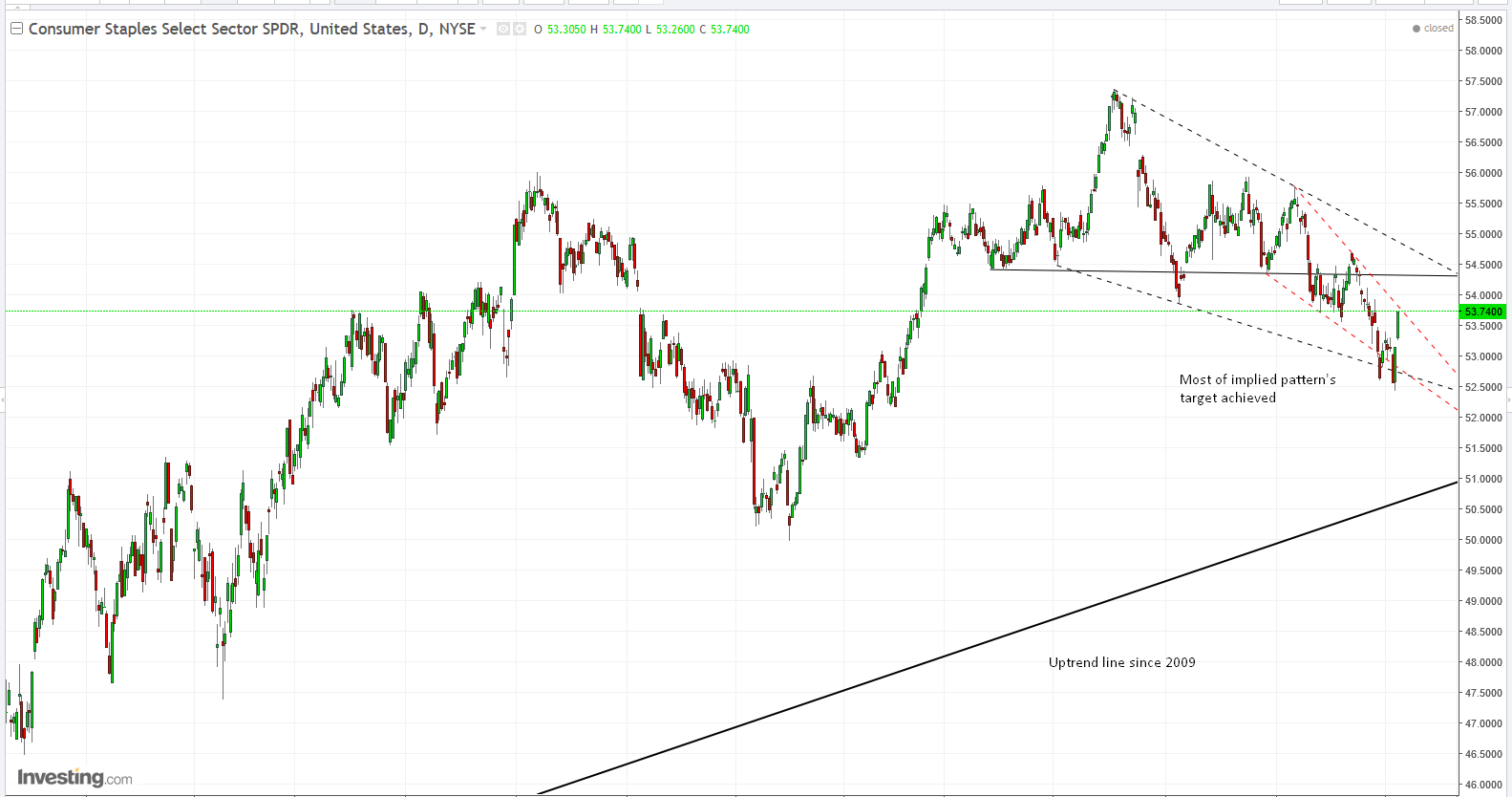
After opening very strongly in Asia, the Nikkei 225 rose as much as 2% before dropping 1.7%, staging the biggest point swing since Trump's surprising victory last November, stocks in Tokyo led Asia into a decline. In the absence of any fundamental reason for the downturn, technical factors were the likely culprits. After Japanese stocks touched their highest level in a quarter century, traders thought they were moving too fast and unwound positions. The Nikkei Volatility index rose 23%, the most since Aug. 9.
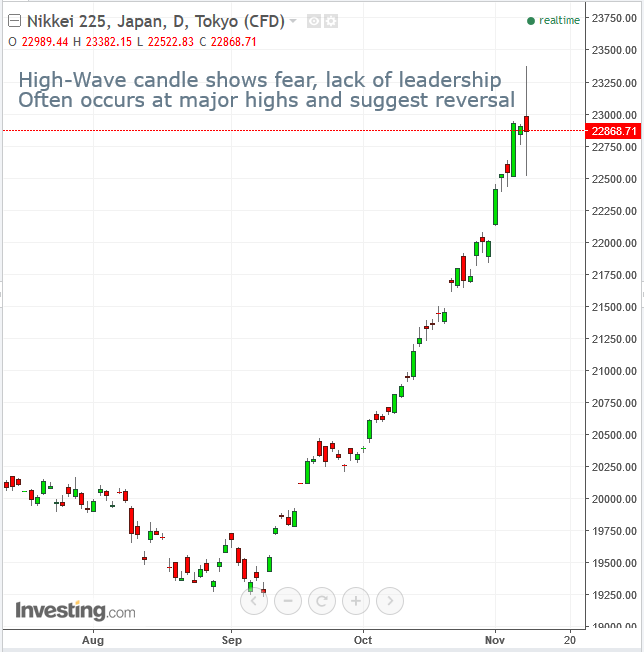
Pessimism seems to have migrated to Europe, where the Stoxx Europe 600 has been falling toward an uptrend line since August 29, as basic resource and energy stocks move down with a decline in industrial metals. Disappointing earnings from German engineering company Siemens (DE:SIEGn) and the world’s biggest wind-turbine maker Vestas Wind Systems (OTC:VWDRY) kicked European shares when they were already down. Siemens reported a worse-than-expected 10 percent drop in industrial profit for its fiscal fourth quarter as its power and wind turbine businesses struggled and its digital unit booked higher costs. Vestas Wind Systems fell 15%, the most since 2012 as profits were lower than forecast as the company warned of market-share loss.
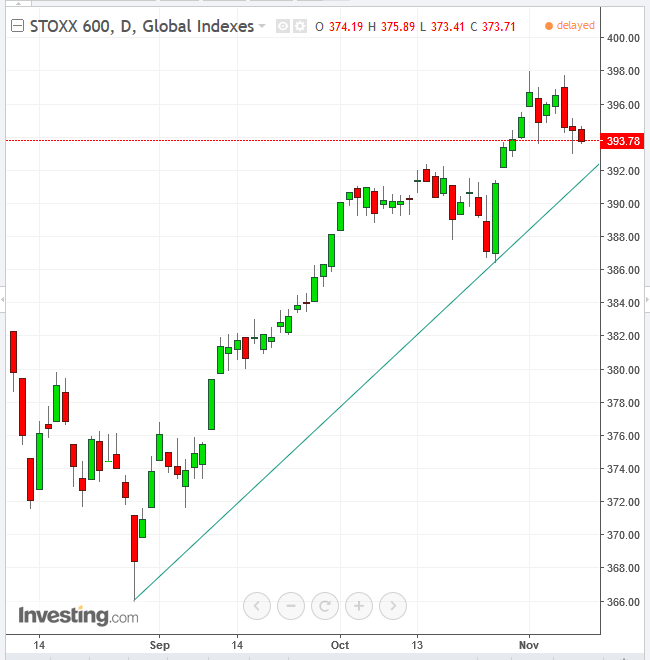
While the euro consolidates in a symmetrical triangle continuation pattern, the pound jumped as talks resumed between the EU and UK, but ultimately wiped out all gains in a third day of decline. The kiwi managed to hold on to Wednesday’s gains after RBNZ indicated it may raise interest rates earlier than expected. Bitcoin hit a new high when a technology upgrade that was threatening to disrupt the biggest cryptocurrency was cancelled.
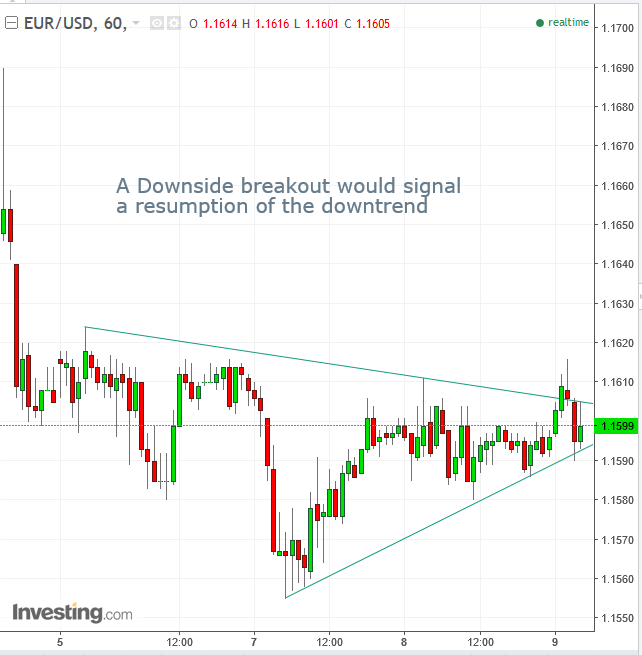
WTI crude oil saw a third day of decline following Wednesday's wild swings as investors focused on an increase in US crude production.
While traders focus on geopolitics as the fly-off-the-cuff president continues his Asia tour, they're taking stock as President Donald Trump closes a year in office. The delicacy of his trip includes two hot-button issues: a coalition against North Korea and an effort to reach better trade deals for the US. China and Russia – two dominant countries – are at the center of the coalition with China straddling both volatile issues.
Taking stock of the market in the past year is not any easier. When Trump was elected, S&P 500 Futures fell 6%, as consensus held a Trump win meant a market crash. Suddenly, his pro-business agenda of tax cuts/reform, infrastructure and deregulation rejuvenated the market's animal spirit. Since then, the market has not seen a single monthly decline, even though none of Trump's agenda has been enacted.
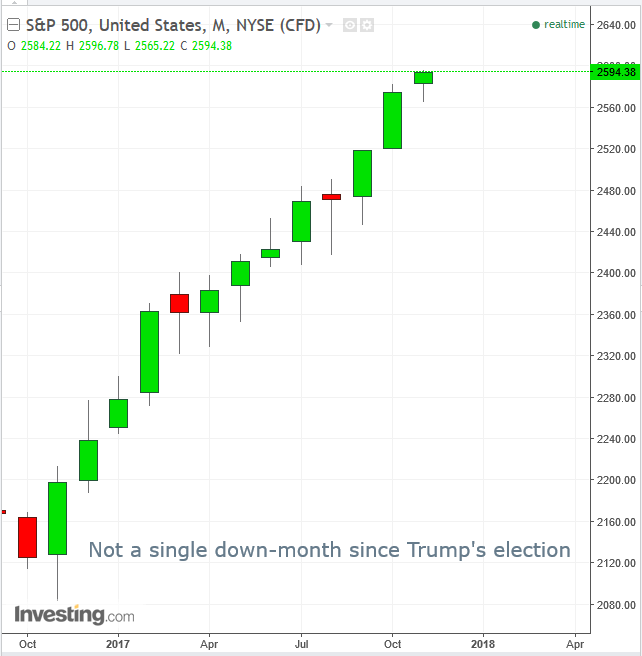
Some investors are not discouraged by the lack of progress and see the market as bullish, thanks to strong earnings, lower interest rates and global growth.
Others are concerned as assets have become expensive on a historical level, drastically lowering return expectations. To get a high return in a low-return environment, investors are reverting to high-risk investments. That high-risk behavior makes the market risky for all participants.
The bottom line is that no one knows what's ahead and that uncertainty is exactly what drives markets nuts.
Data Points To Watch
-
U.S. consumer sentiment probably cooled in early November from a more than 13-year high; the University of Michigan’s report is out on Friday.
-
The Philippines’ central bank announces its rate decision on Thursday.
Market Moves
Stocks
-
The STOXX Europe 600 index declined less than 0.05 percent as of 8:35 London time (3:35 EDT), the lowest in more than a week.
-
The MSCI All-Country World Equity Index index advanced less than 0.05 percent, reaching the highest on record with its 11th consecutive advance.
-
The U.K.’s FTSE 100 index decreased 0.1 percent.
-
Germany’s DAX index decreased 0.1 percent to the lowest in more than a week.
-
The MSCI Emerging Markets index (NYSE:EEM) increased 0.1 percent to the highest in more than six years.
-
Futures on the S&P 500 index declined 0.1 percent, the biggest drop in more than a week.
Currencies
-
The Dollar Index fell 0.08 percent.
-
The euro declined less than 0.05 percent to $1.1594.
-
The British pound climbed 0.2 percent to $1.3138.
-
The Japanese yen increased 0.3 percent to 113.56 per dollar, the strongest in more than a week.
Bonds
-
The yield on 10-year Treasuries decreased two basis points to 2.32 percent.
-
Germany’s 10-year yield gained less than one basis point to 0.33 percent, the biggest gain in more than a week.
-
Britain’s 10-year yield declined less than one basis point to 1.223 percent, the lowest in eight weeks.
Commodities
-
Gold advanced 0.2 percent to $1,283.64 an ounce, the highest in three weeks.
-
West Texas Intermediate crude gained 0.1 percent to $56.88 a barrel.
